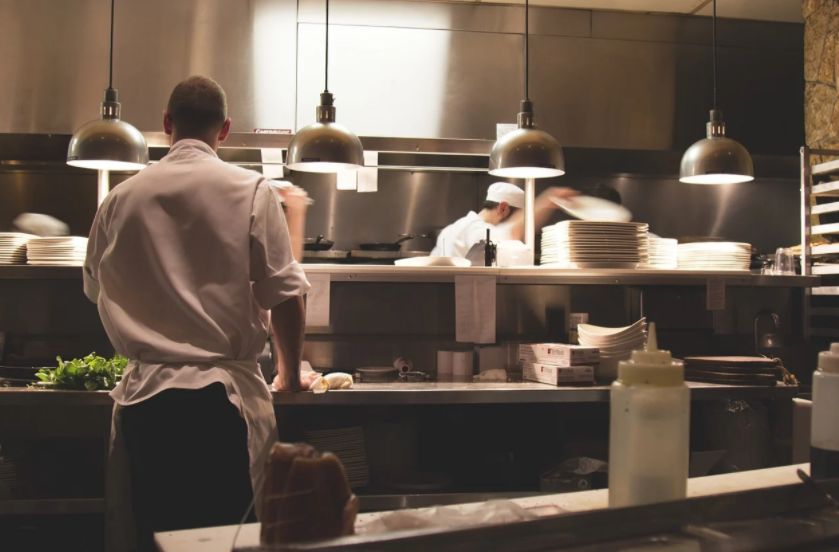In the light of lockdown and with businesses all over the country reopening, there are new measures which business owners must take to ensure their food and hospitality business falls in line with new COVID-19 regulations.
As a direct result of this, we’ve seen an increase in the demand and searches for food hygiene information.
Google Searches For ‘Food Hygiene’
Data source: Google Trends (https://trends.google.com/trends/explore?geo=GB&q=food%20hygiene)
As we can see in the graphic above, searches around food hygiene dramatically spiked around the start of the year, February to be precise. This correlates directly with the rise in Coronavirus cases and falls as we enter lockdown in March before rising again.
Guidance for Food Businesses Following Lockdown
Given the rapid spread of COVID-19 and the impact on the economy, food businesses are among the key areas which are being addressed to get things back on track and ticking as usual.
Though it’s highly unlikely that the virus will be transmitted through food or packaging, restaurants and takeaways can be busy places with concentrated numbers of customers and lots of surfaces where bacteria can lurk.
The rise in demand for food hygiene information mirrors this cause for concern, but there are also other ways in which businesses can prepare to welcome back customers and ensure that their premises are a safe place to eat.
Hand Hygiene
Routine hand-washing is incredibly important in any environment following the pandemic, but perhaps none more so than the food industry. It’s recommended that you wash your hands for 20 seconds with warm water and soap:
- Before and after handling food
- Before handling items used by customers such as clean cutlery, dishes and glasses
- After handling used items such as cutlery and dishes
- After touching high-contact areas such as door handles, taps and surfaces
- After handling money
- When moving between different areas of the kitchen or workplace
- After coughing, sneezing or blowing your nose
Food Hygiene Guidance
As well as taking food hygiene courses, there’s plenty of guidelines out there to help you get to grips with changes you’ll need to make in response to COVID-19 and returning to the kitchen.
There are official government food hygiene guidelines to browse freely as well as guidelines on reopening and adapting following COVID-19 available from the .gov website; these guidelines are aimed at ensuring that both staff and customers are educated in reducing the risks of COVID-19 entering and spreading in the workplace, as well as to the wider community.
Workplace Assessment
Before you return to trading, it’s integral that you carry out a full assessment of your workplace so that government guidelines are fully adhered to. Implement a solid plan for moving forward for operating under these new regulations, and ensure that there are easy-to-follow visual cues and checkpoints in clear view of both staff and customers.
Social distancing must be practised, and so you’ll need to address the positioning of tables and seating, their proximity to each other and serving areas as well as access to restrooms and the main entrance and exit of the premises.
You should also assess the surfaces in the restaurant or takeaway; the likes of tiles and tablecloths provide a surface which the virus can survive and be transmitted through. Do away with tablecloths and look at alternate options, and when it comes to floors, walls and worktops, explore hygienic and long-lasting economical options such as antimicrobial wall cladding and safety flooring for kitchens and restrooms.
NHS Test & Trace
A key component in reducing the risk and spread of COVID-19 is the NHS Test & Trace system. Restaurants will be expected to comply with these measures as well as adhering to social distancing guidelines; any failure to do so can result in the closure of the business, hefty fines and even up to two years imprisonment.
By recording your customer’s name, address, phone number, the number of people they’re dining with and the date and time of their visit, you’re able to trace the patrons as well as inform local authorities and the NHS in the event of a COVID-19 case having visited the premises.
Though they may seem a little drastic and even invasive at first, these measures are in place to protect both workers and visitors, and so regular inspections will be carried out to ensure that measures are being carried out and the necessary steps are taken to safeguard the hospitality sector from further harm.
For further information on any of our products, including our hygienic PVC cladding, speak to one of our team on 0330 100 0313 or email us at sales@bioclad.com.
Related Articles:
5-star hygiene ratings for Harrogate businesses using BioClad’s hygienic wall cladding
